Julie* had known her dating app match for a week when they had their first date in the bar of a central London hotel.
She believed he was a successful banker who was falling head over heels in love with her. But, during their three-month relationship, the 31-year-old was duped out of £65,000 as she found herself the victim of an audacious dating con that, like the victims in Netflix’s wildly popular documentary The Tinder Swindler, saw her lose everything to a stranger who promised her the world.
The Tinder Swindler, which documents how Simon Leviev allegedly used an extravagant fake lifestyle to dupe women out of small fortunes, has clocked up 45 million viewing hours since it dropped on 2 February.
Frankly, we've lost track of his aliases at this point.

At the same time that Leviev was being convicted of fraud, theft and forgery in 2019, Julie was calling time on her own conman after they matched on a vetted site in July earlier that year.
She explains, “I was ready to settle down. He was a professional who claimed to want the same things. He was cultured, well-travelled, educated and interested in my life, values and upbringing. Now, I know he was using that information to manipulate me. At the time, he was charming."
The first red flag was almost instant, according to Julie: “We messaged non-stop. One of the first things he said was that he’d used a different profile name so people couldn’t look him up. He told me his real name was Nick and showed me links to Forbes articles that listed him as a high-flyer. I respected his desire for privacy. It never crossed my mind that he was lying.”
They soon moved their conversation on to WhatsApp, exchanging photos and spending hours on phone calls. Two days before their first date, he claimed he’d lost his wallet at a party, sending photos from the night which later transpired to be years old.
Julie offered to lend him £200. She paid their £75 bar bill and the £300-a-night, five-star hotel room they checked into after the date: “He charmed everyone, even the barman seemed to know him. Our date was amazing, sparks had flown all week.”
One in six women have been financially abused.

Over the next three months, the stakes in their emotionally-charged relationship were raised.
Fraudulent charges for European hotel stays, designer clothes and nights out appeared on her credit card. ‘Nick’– which she later discovered was an alias – said he had been scammed too, claiming their cards must have been cloned during another hotel stay. He showed her pictures of a house he’d bought but made excuses when she planned to visit. He invited her on a Mauritius holiday he’d won at a charity event but said it had been cancelled at the last minute.
His most callous deceit came when he claimed his six-year-old nephew – a boy he had shared photos of – had died suddenly, abroad, asking for £1,000 for a same-day flight.
“Everything was urgent, life or death. Everything had a viable explanation. He’d say his new card hadn’t arrived or money hadn’t landed in his account when he was about to miss a flight or a deadline so I’d send it to another account. He always said he’d pay me back. I had no reason to believe he couldn't.”
He sent pictures and fake pins as he ‘travelled.' When news reports showed civil unrest in the country where he’d grown up, he concocted a story about having to urgently travel there to get his younger brother out.
The new laws designed for greater internet safety are set to be approved by the House of Commons.

“I believed we were in love," Julie explains. "This man had said he wanted children with me. I wanted to help him. When I looked back, his lies were right there in front of me.”
After three months, Julie had maxed out credit cards and taken out a loan. She was £65,000 in debt. Instead of putting down a house deposit, she was now on the verge of being unable to feed herself or pay rent.
“He asked me to add up everything he owed me and meet outside the bank so he could pay me back. I waited for hours. The bank closed and he never came.” She visited his work: “I sat on a concrete bench in the investment bank reception. He was sending angry messages because I’d told him I was there without his say so. He never worked there, so he never showed.
“When I look back, the whole relationship was stressful and isolating. I had been too ashamed to tell friends and family about it in any detail. By the end, I was angry, broke, desperate and hurt. I felt gullible and stupid.”
We aren't safe. But these organisations are fighting to change that.

She reported him to the police, banks and Action Fraud and blocked him on WhatsApp. She discovered aliases and social media threads revealing his real name and cons that appeared to total hundreds of thousands of pounds. The bank revealed he’d already been jailed, for fraud, and they’d been investigating him for 18 months.
Regardless, Julie received less than half of her money back and police said there was insufficient evidence to prosecute. She also moved house, afraid she could be tracked down by him once he’d been exposed.
Action Fraud reports that almost £98 million was lost to online romance scams in Britain, in 2021.
Laura Pomfret, a co-founder of female-focused finance app, Financielle, said Julie’s story highlighted warning signs: “If a partner is asking you to take a debt out in their name, or a significant amount of money, whether that be in a lump sum or smaller amounts over time, this should ring alarm bells."
The film will tell an important story for the #MeToo movement.

Laura continues, “It's perfectly reasonable to say no. We actively encourage open conversations and setting clear boundaries when it comes to money and relationships.”
Julie went back on dating sites three months later and met her current partner, in December 2019. She says: “My friends and family vetted everything about him. I won’t let the man who conned me take my ability to trust, be kind or be loved. I refuse to feel shame or embarrassment anymore. That would only add to the injustice."
As for what she'd say to other women concerned they may be dating a conman? "I’d say the perfect person, the perfect relationship should never come with anxiety or red flags. Dating apps are part of the fabric of society now. Those that run them have to do better. There has to be regulation and consequences.”
*Names and some identifying details have been changed.
For more information about emotional abuse and domestic violence, you can call The Freephone National Domestic Abuse Helpline, run by Refuge on 0808 2000 247.
If you are concerned that you may be a victim of fraud, you can report it to Action Fraud any time of the day or night using their online reporting tool. If you are in immediate danger or risk of harm dial 999 immediately.
And Covid-19 is likely to have made it worse.

